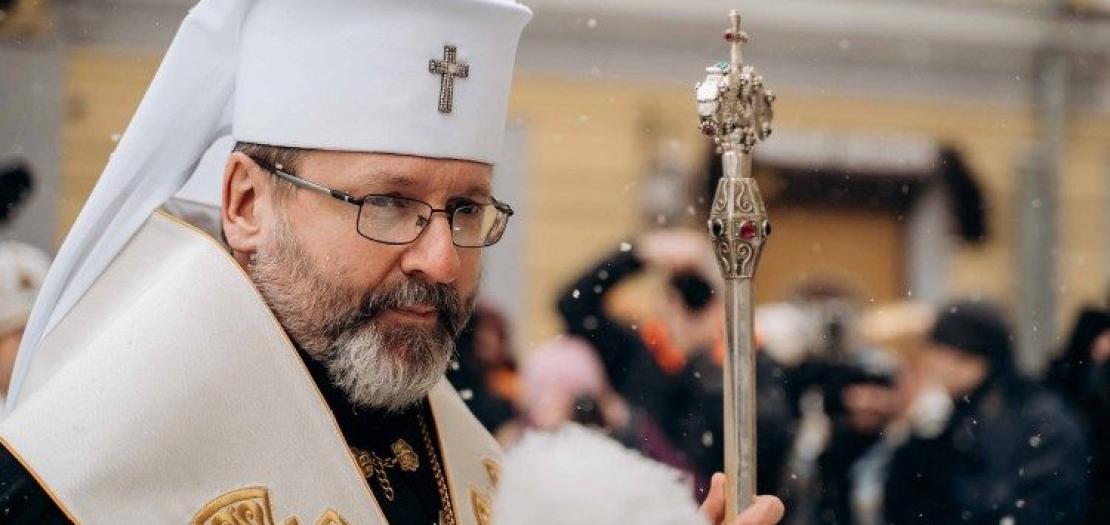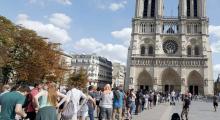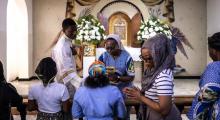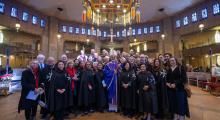Issued by the Catholic Center for Studies and Media - Jordan. Editor-in-chief Fr. Rif'at Bader - موقع أبونا abouna.org

Major Archbishop Sviatoslav Shevchuk speaks of pain but even more of hope as he reflects on the thousand days of war that, since February 2022, have devastated his country, Ukraine.
In an interview with Vatican News, the head of the Ukrainian Greek Catholic Church reiterated his condemnation of the war, describing it as “senseless and sacrilegious."
He also renewed his appeal on behalf of the Ukrainian people for the world to not abandon them: "Do not leave us alone," he says. "Continue to stand by us, even in silence.”
Q: What are the prevailing emotions Ukrainians are feeling today after one thousand days of war, also considering the most recent Russian attacks?
Major Archbishop Shevchuk: If we talk about emotions, on the one hand, there is a growing deep sense of pain. People are deeply wounded because, every day, we are forced to witness the terrible face of death and destruction. On the other hand, looking at how we have lived through the past thousand days, the prevailing feeling is hope—or rather, the virtue and capacity to hold onto hope. Because without hope, it is impossible to live in Ukraine today. When we see how Ukrainian energy infrastructure workers start over and over again after each missile strike and repair the damage within hours, or how our doctors, despite the dangers, rescue people from destroyed homes and save lives—then, alongside the pain, there is hope. Hope arises from people of different professions, social groups, and regions of Ukraine.
Q: Many Ukrainians say the war has profoundly changed them. What changes or transformations, in your view, has the Church in Ukraine experienced? And what of this experience could be shared with Catholics around the world?
When the war began and we suddenly found ourselves under the bombs, we experienced a deep shock. Many psychologists and social scientists, as well as us, from a spiritual perspective, agree that this shock was a kind new beginning: in an instant, all human relationships were shattered, and everything we had understood, known, and lived up to that point was destroyed. This new beginning led to renewal because we had to rebuild our relationships, first with ourselves—each person had to ask, “Who am I? What should I do?.” All masks and appearances fell away, revealing the profound essence of humanity in both its greatness and fragility. This upheaval also triggered another phenomenon: losing and rediscovering our relationship with God.
When you experience bombardment, your house shaking, and the terrible roar of bombs, it feels like you are plunged into a spiritual darkness, crying out, “Lord, where are you? Why have you abandoned me?” like Jesus on the Cross. Yet, the God who seemed absent in that moment reveals Himself, and the Church witnesses a profound conversion—a conversion of priests, bishops, monks, and the faithful, as well as those distant from the Church. People rediscover God as the source of their lives amidst disaster and pain. This is the essence of spiritual and ecclesial life: to lose and find again, to pass through destruction and emerge in a different world, society, or country. That is why everyone says the Ukraine that existed before February 24, 2022, no longer exists. We must rediscover this people, this country, and the Church of Christ among them.
Q: The most precious gift from God is life. In Ukraine, many families grieve the loss of loved ones who have died at the frontlines or in bombings. How does the Church help people continue to love and protect life?
In these circumstances, we feel immersed in an ocean of pain. Human suffering is a mystery, and the Church follows the example of Jesus Christ, who entered into the depths of human suffering to show the way out. We have learned some important lessons.
The first is not to rush to say, “I understand you.” Many people abroad, including friends, say, “We understand you,” but these words cause deep pain because you cannot tell a young man who has lost his legs, “I understand you.”
The second is the importance of simply being present, even if we cannot say anything. The sacrament of presence is crucial. We ask, “Be silent, but stand by us. Do not leave us alone.” The Church’s presence is a sacrament that makes visible the real presence of the Lord among His people.
The third lesson, which is equally important, is the power of the Word. It carries God’s strength, life, hope, and the ability to renew our human and spiritual resources. The Word of the Gospel is truly life—it is not just a beautiful phrase or metaphor. I have seen with my own eyes how, when I proclaimed the Word of God, it literally brought people back to life. It’s a miracle!
Q: In many interviews, we hear Ukrainians say they are the first to desire peace, but what is happening unfortunately seems to push this goal further away. What is the source of hope that a just and lasting peace might come for this tormented country?
We have experienced that this source of hope is not found outside Ukraine, abroad, but within us. They gave us three days... and now we are talking about 1,000 days of a senseless, blasphemous, sacrilegious war. We have seen that right within us there is a bubbling source of resistance, resilience, hope, which becomes a political, military, diplomatic issue.
The aggressor wants to annihilate this bubbling source, refuses to acknowledge its existence, and seeks to destroy it with missiles, bombs, tanks. And sometimes, this source of hope also creates problems for politicians: many see Ukraine as a problem. But they do not understand that within this source lies the solution to many injustices and many situations in the modern world that is experiencing the loss of its humanity. Even diplomats are challenged by this source of hope and resilience in Ukraine; they search for various peace formulas, political negotiation formulas, but so far, they have not found them. I believe this source surely does not have a purely human origin: every day, we see our human strength deplete and then be replenished. There is a spark of life.
Q: Would you like to add anything else?
I would like to add that today in Ukraine, we are truly experiencing something that transcends the boundaries of a single nation, a single country, or even a single Church.
The authentic face of humanity is being revealed, and those who are capable of recognizing it will understand that Ukraine today is not a problem but part of the solution.







